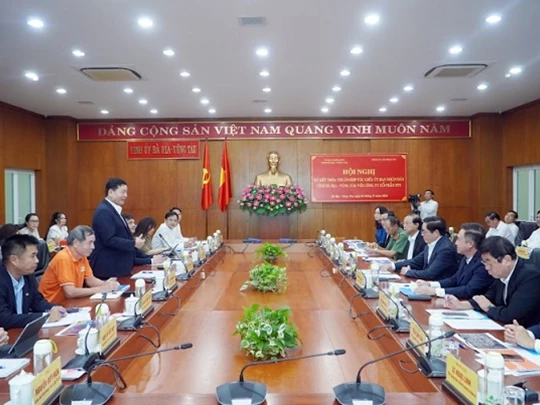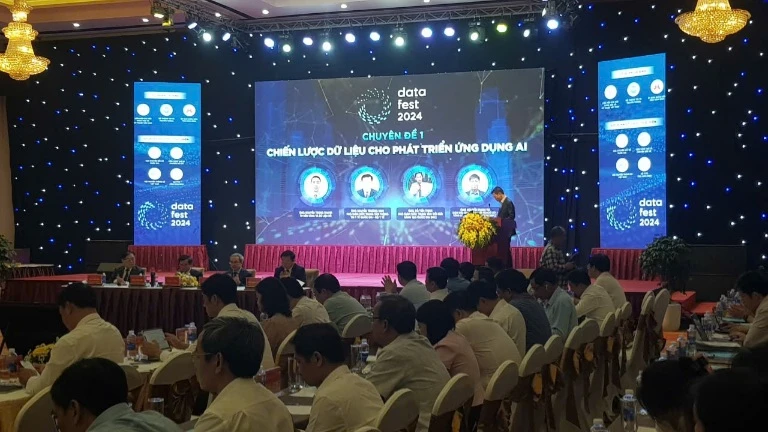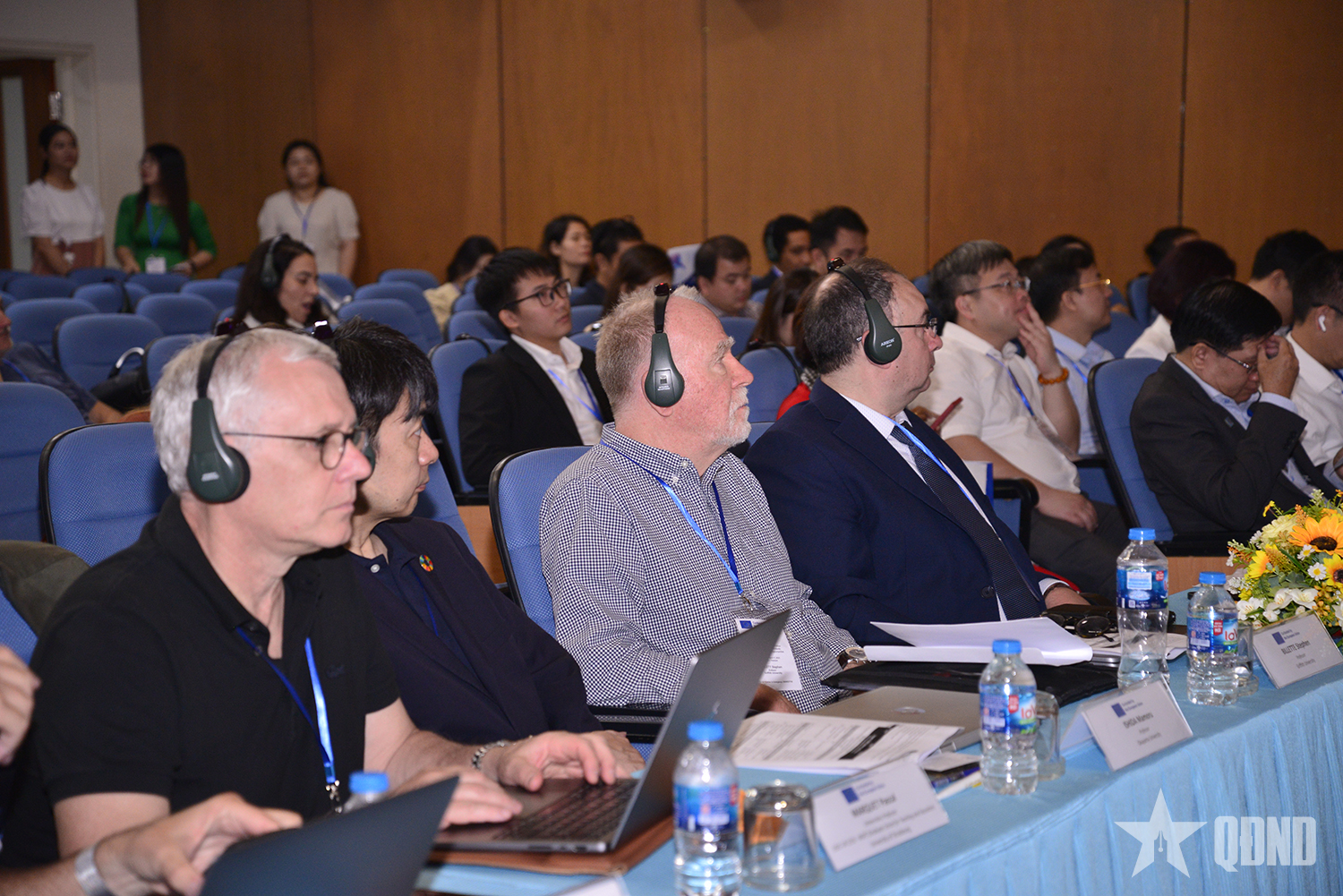SGGP
According to the Department of Information and Communications of Ho Chi Minh City, the target of developing the digital economy of Ho Chi Minh City by 2025 is with GRDP (gross regional product) increasing by about 8% annually; the proportion of the service sector in GRDP is over 60% and the digital economy contributes 25% (in 2025), 40% (in 2030) in GRDP. Therefore, digital data plays a very important role and Ho Chi Minh City has a clear strategy for this resource.
 |
| Patients register for medical examination at Thu Duc City Hospital using electronic medical records. Photo: HOANG HUNG |
As a core asset
In the plan to implement the Program "Digital Transformation of Ho Chi Minh City" and the Project "Building Ho Chi Minh City into a smart city" in 2023, state agencies focus on activities of developing, connecting, sharing, exploiting, and analyzing data to serve digital transformation, developing digital government, digital economy, and digital society with many orientations. In which, data is shared with many users and there is a secure data exchange mechanism, built to support and control data sharing services throughout the city. Currently, many departments, branches, districts, and counties have actively deployed the development of digital data resources.
Specifically, the Ho Chi Minh City Social Insurance sector has linked data with medical examination and treatment facilities and handed over the entire database to the health sector to build electronic health records and medical records; Binh Thanh district has updated population data of 450,000 people with 120,000 households, as a basis for building socio-economic development plans and managing population and household registration.
In District 1, the digitization of civil status data was completed in June 2021, and is continuing to edit and digitize real estate records to make the settlement of people's real estate records faster and more convenient... Standardizing digital data according to the data management strategy not only aims to serve the management work, develop socio-economic development plans, and simplify administrative procedures for people and businesses, but people and businesses can also exploit data and open data provided by state agencies (belonging to the list of data according to regulations) to serve production and business.
According to Mr. Lam Dinh Thang, Director of the Department of Information and Communications of Ho Chi Minh City, the data management strategy of Ho Chi Minh City is built on the lessons of international success, in line with the Government's policies and linked to the city's development goals. The basic principle of data management is to create, maintain assurance, reliability and security for all important data assets of the city. Data is "nourished" by specialized information systems, warehouses, master data centers and data on people, businesses, land, space... will be developed as core assets.
Complete data by 2025
In recent times, Ho Chi Minh City has proposed many solutions to deploy smart cities and digital transformation, in which digital data is identified as an important foundation and key to comprehensive digital transformation, developing the digital economy, building a digital society, and building a digital government. On February 6, 2023, the Ho Chi Minh City People's Committee issued Decision No. 328/QD-UBND approving the Ho Chi Minh City Data Management Strategy to 2025, with a vision to 2030.
The strategy identifies specific tasks and results to be achieved from now until 2025, including deploying a shared data warehouse, deploying specialized and digital information systems, effectively using digital data; providing unified, reliable, secure, and safe data for people, businesses, and researchers to exploit and use to create added value, contributing to the city's socio-economic development...
According to Ms. Vo Thi Trung Trinh, Deputy Director of the Department of Information and Communications of Ho Chi Minh City, to achieve the goals of the data strategy, it is necessary to synchronously implement many disarming groups, not just technical factors. Data is created from the activities of state management agencies, so in addition to being used to improve the quality of public service provision for people and businesses, improving the efficiency of state management agencies, it also plays an important role in promoting the development of the digital economy, innovation and startups. Therefore, state management agencies need to aim to provide data to people and businesses in the form of open data.
“In order for open data provision to achieve the above goals, the city needs to continue to improve regulations on open data provision, as well as create more data. The issue of data provision by state management agencies must both ensure industry regulations, protect personal data, and provide valuable data, updated data so that users can create added value from this data source. This is a problem that the city is continuing to implement the open data policy from state management agencies, contributing to promoting the development of the digital economy and digital society,” Ms. Vo Thi Trung Trinh shared.
Ho Chi Minh City sets specific targets for effective data exploitation by 2025: 100% of the management information system on land, construction licensing, and planning will be uniformly established in the city; complete the creation of electronic health records of people, data on social security; data on establishment, business operations and individual business households; data on budget revenue and expenditure, public investment disbursement; 100% of databases will be stored and managed at the City Data Center, ensuring information security according to regulations.
Source


![[Photo] 2nd Conference of the Party Executive Committee of Central Party Agencies](https://vstatic.vietnam.vn/vietnam/resource/IMAGE/2025/3/31/8f85b88962b34701ac511682b09b1e0d)

![[Photo] General Secretary To Lam receives US Ambassador to Vietnam Marc E. Knapper](https://vstatic.vietnam.vn/vietnam/resource/IMAGE/2025/3/31/5ee45ded5fd548a685618a0b67c42970)
![[Photo] Prime Minister Pham Minh Chinh receives delegation of leaders of US universities](https://vstatic.vietnam.vn/vietnam/resource/IMAGE/2025/3/31/8be7f6be90624512b385fd1690124eaa)

![[Photo] Speeding up construction of Ring Road 3 and Bien Hoa-Vung Tau Expressway](https://vstatic.vietnam.vn/vietnam/resource/IMAGE/2025/3/31/f1431fbe7d604caba041f84a718ccef7)



























































































![[REVIEW OCOP] An Lanh Huong Vet Yen Cat](https://vstatic.vietnam.vn/vietnam/resource/IMAGE/2025/3/27/c25032328e9a47be9991d5be7c0cad8c)

Comment (0)